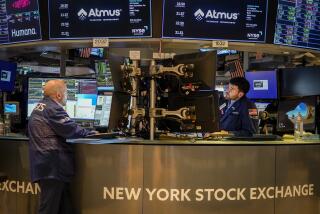Savers Set to Gain From Short-Term Rate Hike
The Federal Reserve hasn’t yet raised its benchmark short-term interest rate, but anticipation of a move is beginning to boost rates on savings accounts -- a welcome change for people who rely on that interest for living expenses.
Nationwide, the average annualized yield on six-month certificates of deposit at banks and other financial institutions has crept up to 1.13% this week from 1.06% early in May, according to rate tracker Informa Research Services Inc. in Calabasas.
It isn’t much, but financial advisors say the shift in direction is encouraging to many people who have earned meager returns on their cash for the last three years as the Fed cut interest rates to generational lows to help the economy.
Some retirees, in particular, have complained that their purchasing power has been slashed by rock-bottom rates.
“They feel that they’ve paid their dues” to bolster the economy, said Greg McBride, an analyst at Bankrate.com in North Palm Beach, Fla.
Rates on bank savings accounts, CDs and money market funds are expected to accelerate once the Fed raises its benchmark rate, the so-called federal funds rate, from the current 46-year low of 1%.
Many economists believe the Fed will raise that rate by a quarter point when policymakers conclude a two-day meeting June 30. It would be the first increase in more than four years.
“There’s an upside to everything, and savers certainly are going to get some benefit from higher interest rates,” said analyst Peter Crane of money market fund tracker IMoneyNet Inc. in Westborough, Mass.
As typically happens when investors begin to anticipate a Fed move, longer-term interest rates, such as on 10-year Treasury notes, have been rising sharply for several months. Those rates are set by the marketplace.
Rates on short-term securities such as six-month Treasury bills also are set by the market, but they are more closely tied to the Fed’s key rate -- and usually don’t begin to move up until investors are convinced that a change is imminent.
That turnaround in sentiment has been pronounced since early May: The annualized yield on six-month T-bills has climbed from 1.20% on May 5 to 1.67% on Wednesday, the highest level in two years.
For money market mutual funds, which hold nearly $2 trillion, there is a lag between changes in market rates and what the funds pay out, or yields. That’s because it takes time for a fund’s investments -- typically T-bills and short-term corporate IOUs -- to mature and be replaced by higher-yielding securities.
The average annualized yield on taxable money funds stood at 0.54% this week, up modestly from 0.51% in April, Crane said. The average fund yield should quickly jump about 0.10 point if the Fed raises its key rate by a quarter point June 30, he said.
The Fed increase would be fully reflected in fund yields about six weeks later, Crane said.
Fed rate increases can be slower to translate into higher savings yields at banks, analysts say. That’s because banks generally don’t peg their deposit rates directly to the Fed’s benchmark, but instead pay what they deem is necessary to stay competitive with other banks.
At 1.13% this week, the average six-month bank CD yield is far below the yield someone could earn on a six-month Treasury bill.
“Banks aren’t going to move that fast,” said Ray Montague, manager of deposit-customer services at Informa Research.
He and other analysts said bank savers -- who hold more than $5 trillion in short-term accounts and CDs -- should get back into the habit of shopping around for the highest returns as interest rates rise.
All banks offer the same federal deposit insurance, so there’s no added risk in taking the best deals, McBride said. On the Bankrate.com website, some banks are offering six-month CD yields as high as 1.9%.
More to Read
Inside the business of entertainment
The Wide Shot brings you news, analysis and insights on everything from streaming wars to production — and what it all means for the future.
You may occasionally receive promotional content from the Los Angeles Times.










